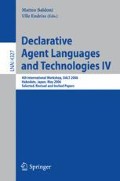Abstract
This paper discusses the problem of efficient propagation of uncertain information in dynamic environments and critical situations. When a number of (distributed) agents have only partial access to information, the explanation(s) and conclusion(s) they can draw from their observations are inevitably uncertain. In this context, the efficient propagation of information is concerned with two interrelated aspects: spreading the information as quickly as possible, and refining the hypotheses at the same time. We describe a formal framework designed to investigate this class of problem, and we report on preliminary results and experiments using the described theory.
Access this chapter
Tax calculation will be finalised at checkout
Purchases are for personal use only
Preview
Unable to display preview. Download preview PDF.
References
Aspnes, J., Hurwood, W.: Spreading rumors rapidly despite an adversary. In: Proc. 15th ACM Symposium on Principles of Distributed Computing, pp. 143–151 (1996)
Bailey, N.: The Mathematical Theory of Infectious Diseases. Charles Griffin and Company, London (1975)
Birman, K., Hayden, M., Ozkasap, O., Xiao, Z., Budiu, M., Minsky, Y.: Bimodal multicast. ACM Transactions on Computer Systems 17(2) (1999)
Braginsky, D., Estrin, D.: Rumor routing algorithm for sensor networks. In: Proceedings of the 1st ACM international workshop on Wireless sensor networks and applications (2002)
Buchegger, S., Le Boudec, J.: The effect of rumor spreading in reputation systems for mobile ad-hoc networks. In: Proceedings of Modeling and Optimization in Mobile, Ad Hoc and Wireless Networks (2003)
Chlebus, B., Kowalski, D.: Gossiping to reach consensus. In: Proceedings of the 14th ACM Symp. on Parallel Algorithms and Architectures, pp. 220–229 (2002)
Cuenca-Acuna, F.M., Peery, C., Martin, R.P., Nguyen, T.D.: PlanetP: Using Gossiping to Build Content Addressable Peer-to-Peer Information Sharing Communities. In: Twelfth IEEE International Symposium on High Performance Distributed Computing (HPDC-12), pp. 236–246. IEEE Press, Los Alamitos (2003)
Demers, A., Greene, D., Hauser, C., Irish, W., Larson, J., Shenker, S., Sturgis, H., Swinehart, D., Terry, D.: Epidemic algorithms for replicated database maintenance. In: Proceedings of 6th ACM Symposium on Principles of Distributed Computing, Vancouver, British Columbia, Canada, pp. 1–12 (1987)
Jung, H., Tambe, M.: Argumentation as distributed constraint satisfaction: Applications and results. In: Proceedings of the fifth international conference on Autonomous agents (AGENTS 2001), pp. 324–331 (2001)
Kapferer, J.-N.: Rumeurs, le plus vieux média du monde. Points Actuel (1990)
Karunatillake, N.C., Jennings, N.R.: Is it worth arguing? In: Rahwan, I., Moraïtis, P., Reed, C. (eds.) ArgMAS 2004. LNCS, vol. 3366, pp. 62–67. Springer, Heidelberg (2005)
Lin, M.-J., Marzullo, K.: Directional gossip: Gossip in a wide area network. In: Hlavicka, J., Maehle, E., Pataricza, A. (eds.) EDDC 1999. LNCS, vol. 1667, p. 364. Springer, Heidelberg (1999)
Parsons, S., Sierra, C., Jennings, N.R.: Agents that reason and negotiate by arguing. Journal of Logic and Computation 8(3), 261–292 (1998)
Poole, D.: Explanation and prediction: An architecture for default and abductive reasoning. Computational Intelligence 5(2), 97–110 (1989)
Poole, D.: A methodology for using a default and abductive reasoning system. International Journal of Intelligent Systems 5, 521–548 (1990)
Roos, N., ten Tije, A., Witteveen, C.: A protocol for multi-agent diagnosis with spatially distributed knowledge. In: Proceedings of the Second international joint conference on Autonomous Agents and Multi-Agent Systems (AAMAS 2003), pp. 655–661 (2003)
Roos, N., ten Tije, A., Witteveen, C.: Reaching diagnostic agreement in multiagent diagnosis. In: Proceedings of the Third International joint conference on Autonomous Agents and Multi-Agent System (AAMAS 2004), pp. 1254–1255 (2004)
Saks, M., Shavit, N., Woll, H.: Optimal time randomized consensus - making resilient algorithms fast in practice. In: Proceedings of the 2nd ACM-SIAM Symposium on Discrete Algorithms, pp. 351–362 (1991)
Even, S., Monien, B.: On the number of rounds needed to disseminate information. In: Proceedings of the First Annual ACM Symposium on Parallel Algorithms and Architectures, pp. 318–327 (1989)
Shibutani, T.: Improvised News: A Sociological Study of Rumor, Indianapolis and New york (1966)
Ye, F., Zhong, G., Lu, S., Zhang, L.: Gradient broadcast: A robust data delivery protocol for large scale sensor networks. ACM Wireless Networks 11(2) (2005)
Author information
Authors and Affiliations
Editor information
Editors and Affiliations
Rights and permissions
Copyright information
© 2006 Springer-Verlag Berlin Heidelberg
About this paper
Cite this paper
Bourgne, G., Maudet, N., Pinson, S. (2006). When Agents Communicate Hypotheses in Critical Situations. In: Baldoni, M., Endriss, U. (eds) Declarative Agent Languages and Technologies IV. DALT 2006. Lecture Notes in Computer Science(), vol 4327. Springer, Berlin, Heidelberg. https://doi.org/10.1007/11961536_7
Download citation
DOI: https://doi.org/10.1007/11961536_7
Publisher Name: Springer, Berlin, Heidelberg
Print ISBN: 978-3-540-68959-1
Online ISBN: 978-3-540-68961-4
eBook Packages: Computer ScienceComputer Science (R0)

